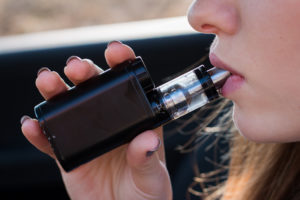by Dr. Stephen Fries
Pediatrics Department
Boulder Medical Center
According to the 2018 National Youth Tobacco Survey, conducted by the FDA and the Centers for Disease Control and Prevention, vaping had increased 78 percent among high school students since 2017 and almost 48 percent of middle school students reported vaping at least once in the previous 30 days.
On a local level, the 2017 Health Kids Colorado Survey found that 36 percent of teens in Boulder County regularly used e-cigarettes, the second highest usage rate in the state. This rate is significantly higher than the state average of 27 percent.
At a time when vaping is at epidemic levels among our youth, more and more hazards are being reported through various public channels and I am also hearing many stories in my pediatric clinic about problems with my patients and within our community.
These stories include vape pens exploding in pockets or purses, or while being vaped, causing serious bodily injury to the victim. Vape devices exploding in victims’ faces have caused serious and permanent injury and blindness.
The newest reports involve severe acute lung disease from vaping, mainly in men, the mean age being 23 years old. Colorado has not been spared from vape-related lung illness cases that have killed young people nationwide. Many medical professionals, including myself, believe there is something in the way vape pens work that causes toxicity in some individuals, but so far there is no common cause among the patients who have acute lung damage.
{UPDATE: Read “Lung Damage From Vaping Resembles Chemical Burns…” }
I also recently spoke to a dentist who stated that vape devices deposit chemical residue on the teeth. The residue is difficult to remove and traps bacteria, causing rapid decay. He said he filled 13 cavities in one patient who vapes, only to have that patient return with another 19 cavities that needed to be filled.
In addition to these issues, vaping nicotine can cause serious addiction problems. According to the organization, Truth Initiative, one JUUL pod contains 20 cigarettes worth of nicotine. Nicotine is more addictive than opiates; once addicted, it is very difficult for a person to stop using. Also according to the Truth Initiative: “Early nicotine use can harm brain development, alter nerve cell functioning and increase the risk of young people smoking cigarettes. In fact, young people who use e-cigarettes are four times more likely to go on to smoke cigarettes than their peers who do not vape.”
Unfortunately, vape devices are not regulated, especially those that burn marijuana and other THC oils.
Another Look at Cannabis from a Medical Perspective
Through the years, I have observed impacts of cannabis use on my patients and larger community. Here are a few updates:
-
- Pesticide Use & Cannabis: According to a 2019 Environmental Health Perspectives (EHP) report, toxic pesticide use on cannabis is questionable. The EHP explains, “pesticide use in agriculture is regulated by the U.S. Environmental Protection Agency (EPA) and overseen by state and local governments. Yet because the federal government still considers cannabis an illegal drug, the EPA has not approved any pesticides for use on the plant, nor has the agency provided any indication of the level of residues on cannabis products—if any—that could be considered safe.” I have been told that marijuana growers use the cheapest insecticide they can find to prevent insect infestations in their crops, and these pesticides are not washed off before the marijuana is smoked — a harmful combination.
- Cannabis Toxicity: The medical community is seeing more toxicity from marijuana due to the high THC content of cannabis sold in states where recreational use is legal, like Colorado. Reports of acute and chronic psychosis (a thought disorder such as schizophrenia) are common. Teens and young adults come to emergency departments with hallucinations and paranoia, symptoms which sometimes become chronic or permanent.
- Pernicious Vomiting: Another symptom that we are seeing is “pernicious vomiting”, or excessive vomiting. The condition known as cannabinoid hyperemesis syndrome (CHS) is a condition that can lead to repeated and severe bouts of vomiting.
- Lung Health: Because marijuana is usually smoked, years of smoking will cause chronic lung disease just like cigarettes. According to the American Lung Association, “Smoke is harmful to lung health. Whether from burning wood, tobacco or marijuana, toxins and carcinogens are released from the combustion of materials. Smoke from marijuana combustion has been shown to contain many of the same toxins, irritants and carcinogens as tobacco smoke. Beyond just what’s in the smoke alone, marijuana is typically smoked differently than tobacco. Marijuana smokers tend to inhale more deeply and hold their breath longer than cigarette smokers, which leads to a greater exposure per breath to tar.”
Additional Resources:
- Vaping: What You Need to Know And How to Talk With Your Kids About Vaping
Partnership for Drug-Free Kids - Marijuana Health Impacts
Information from Boulder County
About Dr. Stephens Fries
Pediatrician
 Dr. Fries moved to Boulder in 1980 to open his pediatrics practice at Boulder Medical Center. Since then, he has found Boulder to be a rewarding place to practice medicine because of the many parents who place a high value on quality care for their children.
Dr. Fries moved to Boulder in 1980 to open his pediatrics practice at Boulder Medical Center. Since then, he has found Boulder to be a rewarding place to practice medicine because of the many parents who place a high value on quality care for their children.
“Many of the patients who grew up in my practice are now parents themselves,” Dr. Fried says. “I am proud to serve them and all of my families. I really enjoy caring for special needs children and helping them navigate through the health care system. I have the best job in the world.”


